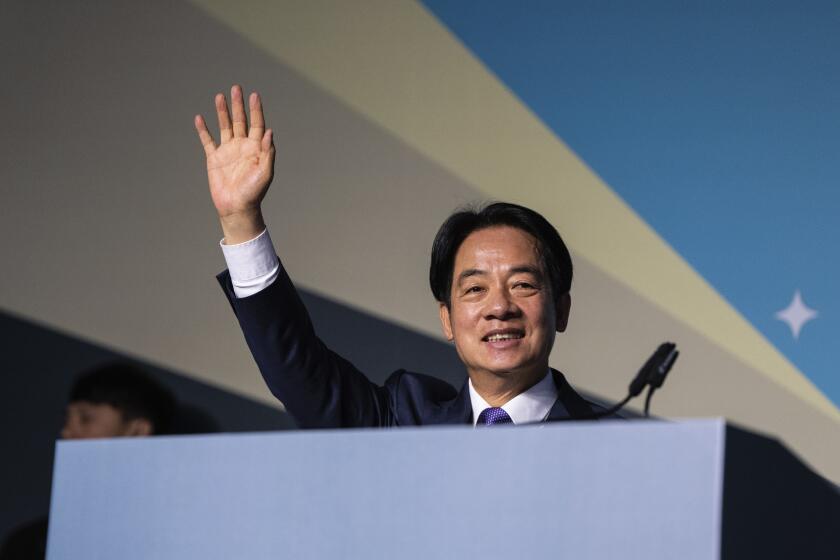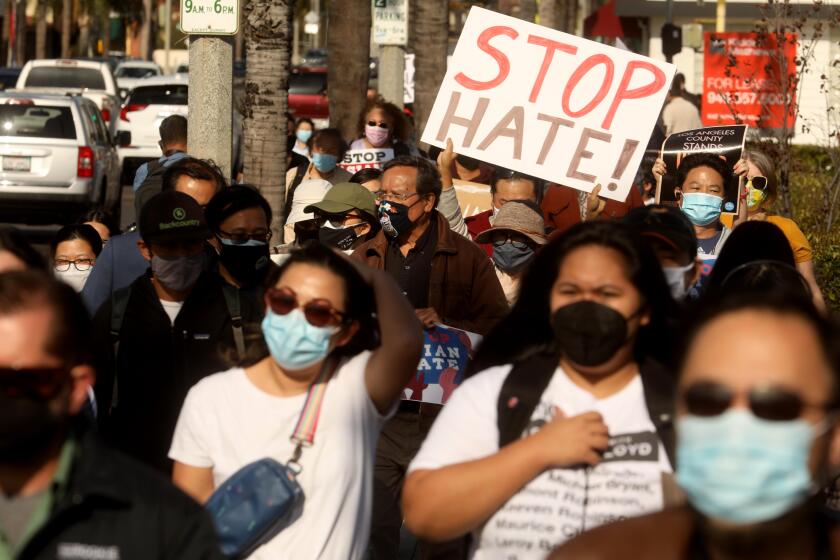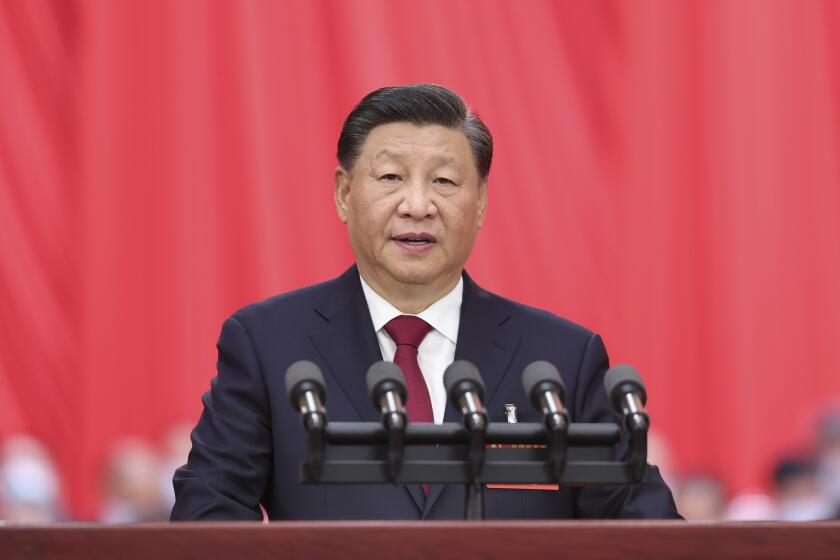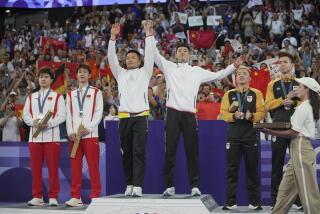Opinion: Taiwan keeps choosing democracy — and rejecting China

- Share via
China has tried the velvet glove. China has tried intimidation and coercion. China has tried political warfare. Nothing has worked. Taiwan’s people keep delivering election results that are anathema to Beijing.
On Saturday, voters in the island democracy elected Lai Ching-te to the presidency. Lai, the current vice president, now leads the Democratic Progressive Party, which emphasizes Taiwanese identity and is skeptical of closer ties with China. The current president, Tsai Ing-wen, also of the DPP, has described Taiwan as “an independent country already” under the name “Republic of China (Taiwan).” Lai has vowed to stick to that formulation, which is consistent with the decades-old status quo, though he raised some eyebrows several years ago by referring to himself as a “pragmatic worker for Taiwan independence.”
Incoming Taiwanese President Lai Ching-te must grapple with an increasingly fraught relationship with China that has edged closer to armed conflict.
Beijing warned last week of “the extreme danger of Lai Ching-te’s triggering of cross-strait confrontation and conflict.” More than 40% of Taiwanese voters shrugged their shoulders and cast their vote for him anyway.
Beijing may take some solace in the fact that Lai won only a plurality of voters. Had Hou Yu-ih and Ko Wen-je, of the Kuomintang and the Taiwan People’s Party, respectively, formed a unity ticket — as they attempted and failed to do in November — the results may have been different. Both the KMT and the TPP are more amenable to closer ties with China, and the KMT has long been the Chinese Communist Party’s main dialogue partner in Taiwan. Beijing would have been content with a victory by either.
But if the opposition had won, strong anti-unification sentiment would still drive Taiwan’s politics. The last period of cross-strait detente, during the presidency of the KMT’s Ma Ying-jeou, ended in 2014 with the Sunflower Movement. A student-led occupation of the legislature sparked the mass protest, which involved hundreds of thousands of marchers opposing passage of a cross-strait trade agreement. The movement put the brakes on tightening ties with China. In the lead up to Saturday’s vote, Hou, the KMT candidate, had vowed not to pursue political talks with China.
I didn’t used to be so conscious of my background. But in recent years, a lot has changed between China and the U.S.
Even if Hou wanted to — and Beijing would have ultimately pressured him to do so — there’d be little domestic support for the effort. Three decades of public polling show shrinking support in Taiwan for unification and the development of a distinct Taiwanese identity.
Indeed, Chinese President Xi Jinping seems to have concluded some years ago that uncoerced unification was not in the cards. After voters handed the KMT a stunning victory in the 2018 nationwide elections for municipality and county leaders (roughly akin to American midterms in political significance), public approval ratings for Tsai and Lai, who was then the premier, hit a record low. A path seemed to open for the KMT to retake the presidency 14 months later.
Xi blocked that path. Delivering a speech in January 2019 to mark the 40th anniversary of Deng Xiaoping’s “Message to Compatriots in Taiwan,” Xi offered more restrictive terms for unification than previous leaders had, eschewing past promises that Taiwan could maintain its military and political institutions. He continued pushing a one-country/two-systems approach to unification — the arrangement under which Hong Kong had maintained political autonomy and personal freedoms — even as his crackdown on Hong Kong mounted.
Tsai deftly cast herself as a defender of freedoms that China was intent on crushing, and she marched to an easy reelection in 2020.
Xi’s approach to cross-strait relations in recent years, which has featured tough rhetoric, military intimidation, economic coercion and political interference, suggests that advancing unification by winning hearts and minds in Taiwan is of little interest to him, perhaps because he knows that, absent fundamental political change in China (and maybe even then), such cooperation will not be forthcoming.
Xi is on a long-haul quest to transform the country.
The turnout in Saturday’s election — nearly 72% — provides ample evidence of the Taiwanese people’s commitment to their democracy, even if they have different ideas about how to best protect it.
Perhaps not this year, and perhaps not even this decade, a crisis is coming. Not because Taiwan has elected Lai, but because Taiwan has rejected China — and Beijing sees no practical way to change that. What happens when an unstoppable force meets an immovable object? The world may find out sooner than anyone would like.
Michael Mazza is a senior director at the Project 2049 Institute and a senior non-resident fellow at the Global Taiwan Institute.
More to Read
A cure for the common opinion
Get thought-provoking perspectives with our weekly newsletter.
You may occasionally receive promotional content from the Los Angeles Times.













